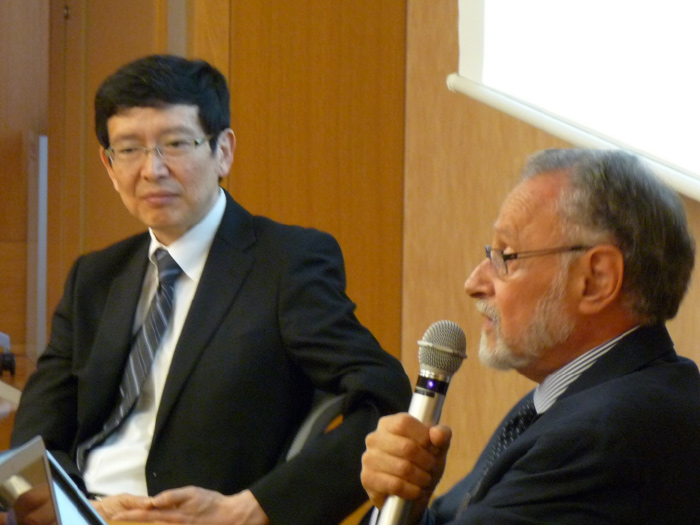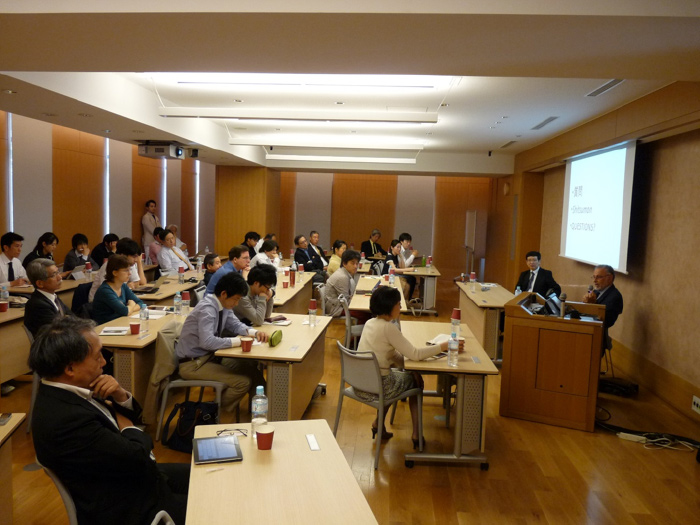SSU Forum with Professor Ellis Krauss
| Date: | Thursday, April 30 2015, 10:30-12:00 |
|---|---|
| Venue: | Conference Room, 3rd Floor, Ito International Research Center |
| Subject: | The Yoshida Doctrine, Abe's Foreign Policies, and the 2014 Election |
| Lecture: | Professor Ellis Krauss, University of California, San Diego |
| Hosted by: | Security Studies Unit, Policy Alternatives Research Institute, the University of Tokyo |
| Co-hosted by: | The Economy-Security Nexus |
The SSU was delighted to host Ellis Krauss, Emeritus Professor of Japanese Politics and Policy-Making at the University of California (San Diego), who delivered a talk entitled “The Yoshida Doctrine, Abe's Foreign Policy, and the 2014 Elections: Abe, the Public, and Japan's National Interests”.
The session was chaired by Professor Keisuke Iida, who introduced the guest by reminding the audience of his prolific research activity, including the book Beyond Bilateralism: U.S.-Japan Relations in the New Asia Pacific (Stanford University Press, 2004), and the most recent volume The Rise and Fall of Japan's LDP: Political Party Organizations as Institutions (Cornell University Press, 2010).

Professor Krauss thanked Professor Iida for the kind introduction, expressing his gratitude for being invited to talk at the University of Tokyo. He immediately introduced the topic of the forum, namely a discussion of Prime Minister Abe's activities in the context of Japanese foreign policy until the 2014 elections. In Professor Krauss's view, the Yoshida doctrine, which has regulated Tokyo's foreign policy for decades after the end of WWII, finds itself now at the terminal state of a long period of decline. Abe's policies of proactive pacifism and more intense participation in global affairs are designed to terminate it entirely. However, the Japanese public appears to be in favour of keeping the Yoshida doctrine in place, therefore showing little or very limited support for the government's stance.

Professor Krauss illustrated the situation by initially recalling the beginnings, historical role and content of the Yoshida doctrine and the Japanese constitution, which in no way created a “pacifist Japan”, but an “anti-militarist” state, capable however of defending itself. He also recalled that the original Yoshida doctrine was in the long term aimed at re-arming Japan, once the status of economic great power was attained. The doctrine was a brilliant answer to the alliance dilemma, caught between the fear of entrapment and of abandonment. Even if the doctrine worked well for the time it was conceived, and even if the Japanese public would like to retain it, it looks increasingly anachronistic, as the original international and security context of Asia and the world at large is now very different, and it is changing very rapidly. Historically, the Yoshida doctrine is already overhauled. Prime Minister Abe has therefore envisaged a path for the construction of a new national defence model, with numerous steps already taken in this direction (creation of a national security council, a new law on state secrets, the strengthening of intelligence services and so on). Abe's policies are designed to gather the favour of those Asian nations (and of the US allies) who are worried about China's “rise”. However, such efforts are unfortunately continuously undermined by the Prime Minister's stance on the issue of historical memories. His visit to Yasukuni shrine in particular has severely affected his diplomatic capital.
On the domestic political front, Professor Krauss addressed the question of why Japanese voters have continued to favour Abe, even if they clearly do not share his views on foreign and defence policies. He illustrated a number of survey results, demonstrating a tepid support also for the other main initiatives of the current administration, particularly “Abenomics”. How can Abe's electoral success be explained? The key factor is not so much the Prime Minister or the LDP's appeal, but the lack of political alternatives, particularly after the very disappointing experience of the DJP governments (2009-2012). The Japanese voters seem to be choosing Abe and the LDP largely in response to a need for stability and competence, which they cannot find in the main opposition party, while dissatisfied voters supported in the last election the Communist Party.
In conclusion, Professor Krauss summarised his talk remarking that in many ways Japan is stuck in the past. On the one hand, Prime Minister Abe insists on a problematic historical narrative of Imperial Japan, even at the cost of harming the country's diplomatic position. On the other, the Japanese public still clings to an outdated, historically anachronistic Yoshida Doctrine.

-
University of California, San Diego
